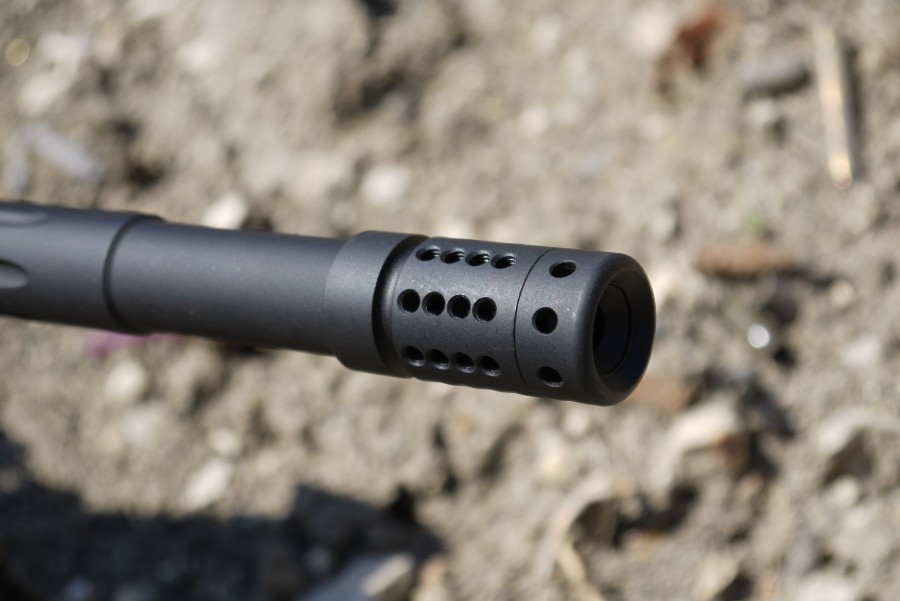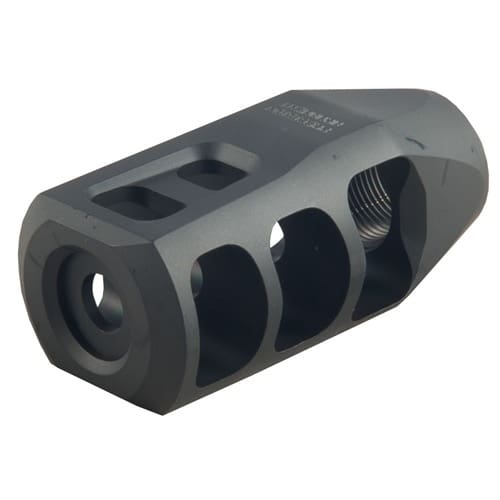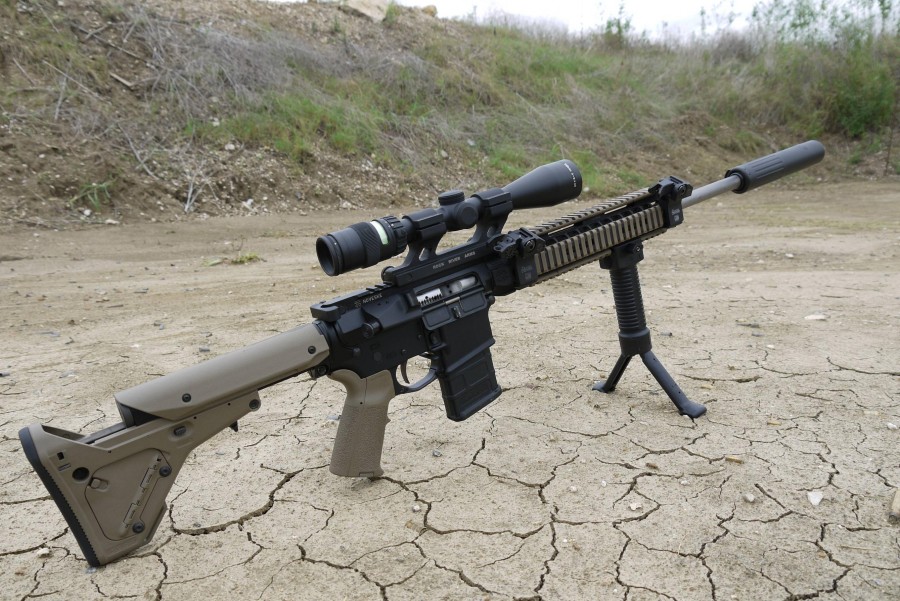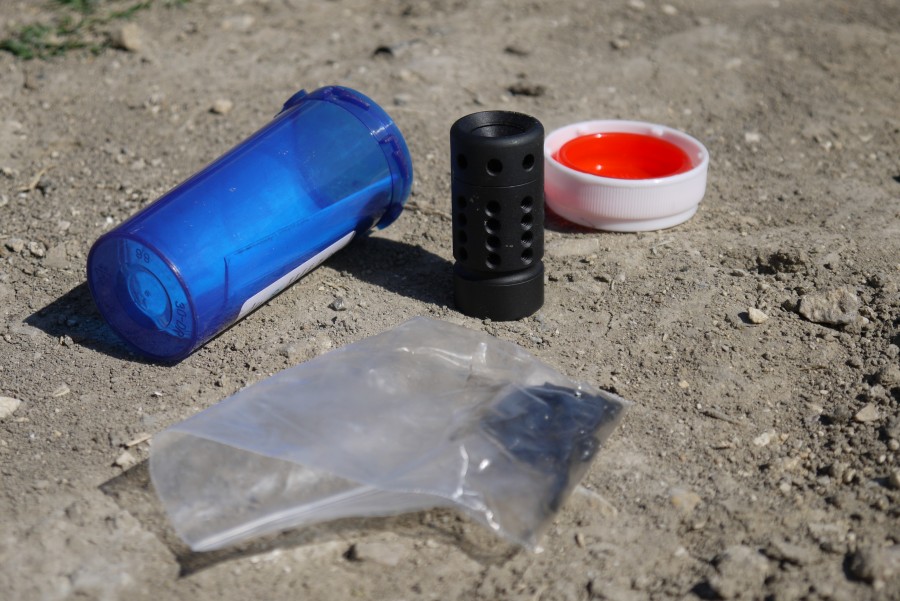Reader Don writes:
I really enjoy reading your reviews and you actually inspired me to try a 3 gun competition at my local range. Even after negotiating through my California bullet button and 10 round mags on my AR, I still have a blast and plan to compete again this month. At the competition, each paper target required two shots. One thing that was obvious is that many guys were able to get that second shot off much faster than I was. Initially I attributed to me having iron (actually plastic magpul) sights on my AR while most of them had red dots. After talking to the other shooters and and them observing them shooting, it looks like the muzzle breaks make a big difference as well (my AR has the stock A2 flash hider). There were a variety of different breaks in use from sure fire to battle comp 1.0. I was looking through your past articles and was not able to come up with much info on muzzle breaks. Could you provide some information and/or suggestions on muzzle breaks? They appear to be expensive (compared to an A2 flash hider) so I wanted to see what others experiences are before I went all in.
It’s definitely the brake and not the sights. People might bash irons, but they’re damn quick if you’ve practiced with them. Let me share with you what I’ve learned . . .
When I first put a compensator on my competition AR-15, my teammates laughed at me for being a pansy. Something about how I needed some help with the “punishing recoil” of the 5.56 cartridge. But when I consistently beat them in competition after competition, they changed their tune and joined in.
When a gun goes off, what’s really happening is that a small cache of powder is burning in your chamber and creating gasses that propel a projectile down the barrel. When the projectile leaves the muzzle, these gasses escape and are turned into noise — the report of the firearm. Those expanding gasses, in addition to the projectile, create a sizable impulse rearward, as Newton’s laws of physics need to be satisfied with the conservation of mass and momentum (equal and opposite reaction and all that). That’s the recoil we feel. And the more mass, the harder the recoil.
A muzzle brake or compensator is a device attached to the end of your rifle that uses the excess gasses from the round going off to create a force that counteracts the recoil of the gun. It does this by redirecting the gasses as they leave the barrel and having them apply some forward force to the baffles of the brake. The net effect of the muzzle brake is that the felt recoil of the gun is reduced.
Recoil reduction isn’t the only thing that a brake does, though. With most modern guns, there is a significant amount of upward movement of the muzzle in addition to the rearwards recoil. Muzzle brakes compensate for that muzzle climb as well. Some even compensate for the rotational force applied by the spinning bullet in the barrel.
The general rule of thumb for muzzle brakes is the bigger and more aggressive the brake, the more recoil is mitigated. Like this gigantic one here. The idea is that the more surface area there is for the escaping gas to contact, the more recoil reduction there will be.
But bigger isn’t always better, for two big reasons.
First, bigger muzzle brakes and compensators make the gun much louder for those standing nearby. I’ve had more than one person complain about my competition rifle with muzzle brake while on the firing line, even when larger caliber rifles are only a few steps away. For someone who enjoys their quiet firearms these days, a compensator can be a little annoying. And bigger ones are almost always louder.
Second is that big muzzle brakes aren’t necessarily “legal” for competition shooting. For 3-gun, most divisions limit you to a 1 inch by 3 inch muzzle brake at the absolute maximum, and larger ones (silencers are included here) kick you into open division. It keeps the competition fair, limiting the help you get from muzzle devices.
So, what is best in muzzle brakes?
Silencers, believe it or not, are fantastic muzzle brakes. Go figure that the same mechanics that trap the gasses and quiet down your gun also reduce recoil. But they’re not competition legal for most cases, and include a $200 stamp and some paperwork.
My favorite muzzle brake of all time is one I had on my rifle for a while: the PRI MSTN QC Brake.

This brake, available in stainless and black finish, uses three chambers to redirect the gasses and counteract the PUNISHING RECOIL of the 5.56 cartridge. Its competition legal, does a fantastic job, and is usually in stock (unlike the similar JP Enterprises brake which is (A) a little flashy, (B) lacks a chamber and (C) a little flashy).
However, if you’re a gigantic nerd like me and want to fine tune your compensator to exactly match your gun’s recoil, then the Ares Armor Effin A compensator is what you need. Available for .308 and 5.56, this device will allow you to fine tune the way the gasses are redirected, and if you love tinkering with stuff this is right up your alley.
In the end, it comes down to personal preference. I really like the PRI MSTN QC brake, and so do all of my friends who have tried it (and still use it on their competition guns), but there are other options, and by no means have I tried them all. If you find one that you like, go for it and be happy.
And a word of advice: double check that you get it in the right thread pitch for your barrel.
[Email your firearms-related questions to “Ask Foghorn” via [email protected]. Click here to browse previous posts]








Yes, muzzle brakes do everything that is said and one more thing. They ruin your hearing. I wish I never heard of them. The noise of the muzzle blast is not actually more but it is directed to the shooter and to those to the side of him. Hearing protection helps but it doesn’t totally mitigate the damage. Of course there are hunting situations where hearing protection is not worn. A good muzzle brake will make the recoil of a .300 Win Mag feel like a .243. The price to pay is a life of asking people to repeat themselves and making going out to restaurants and other noisy environments an unpleasant experience.
If you value your hearing stay away from muzzle brakes. They are not worth it.
I vehemently agree with this. I have changed out my AR’s to either put on a forward-ported comp or, on new AR’s that I build, I have an 11 degree target crown without any threading or comp/brake at all. In the near future, none of my AR’s will have a brake or comp. I’m at a point in my life where I’ve had it with excess noise.
Want to talk about guys you wish would leave the range? Then let’s talk about the yahoos who port trap or sporting clays shotguns. Shotgun reports aren’t all that objectionable – until you’re next to some yahoo who is simply a wuss about gun weight or who won’t spend the money to get his gun fitted properly. Even with hearing protection, those yahoos can ruin a day’s shotgunning.
Muzzle brakes are at best a poor solution to the issue of recoil. There are many mercury recoil reducers that can be put into a buttstock for heavy recoiling rifles (of which an AR is not one), and proper gun fitting can work wonders for many people’s perception of recoil. An ill-fitting gun makes for fatigue and pain.
This is an issue which comes up with me on a periodic basis.
The recoil is not a problem for me.
It’s the muzzle flip that gives me problems – in long and short guns.
My Main AR has a bird cage at the end of a 16″ barrel with a midlenght gas port and a free-float handguard that ends at the front of the has block. Even if it was natural for me to do one of those forward holds of the rifle with my support arm, I could not do it.
So is there a way to deal with the muzzle flip and be able to do double tap drills and not have groups exceed 2″ at 50 yards?
Also an option: earplugs under earmuffs. I wear Peltor Combat plugs under my Leight electronic muffs at the indoor range, and when I’m shooting (or near) compensated rifles at outdoor ranges. Works fine, as proven by my hearing tests over the last 5 years.
I second this.
Wear earplugs with sound amplification hearing protection. I’ve always doubled up ever since I started shooting. I’ve never felt earmuffs alone are sufficient. Especially given eye protection going over my ears makes the fitting of my earpro not quite optimal.
The last time I was at the range the guy next to me was shooting his AR with a muzzle break. I had to keep looking over because I was convinced he was shooting 308 or larger – it made the most hellascious BOOM!
On a AR-15 never needed or had to get a compensator. On the competitions I shot I had a A2 FH on all the rifles I used. I kicked but with a stock AR over ARs with compensators and FF barrel assemblies.On larger calibers I do see the need for accuracy on a .300 Win mag the compensator makes sense. Over most of this is over Hype and BIG money companies make for compensators if you want one for a puny AR that’s fine but you dont need one either.
I have been a competitive bolt action rifle shooter for 25 years. To set the record straight, compensators do NOT improve accuracy with bolt-action rifles. They merely reduce recoil and drive fellow shooters crazy due to the lateral concussion from the brakes. Noise is not the factor: it’s the concussion. Brakes might be an answer for large calibers to reduce recoil, but for .223 calibers, they are quite useless when used on semi-automatic or bolt-action rifles.
Sorry but 5 years isn’t enough. I have been shooting decades. I got my first own gun when I was 13 and admit people didn’t use hearing protection back then, at least very few did. Hearing loss is cumulative. Believe me, brakes are not worth it. Yes, if you use double protection every single time you shoot and the people around you have the same protection then I guess they are OK but that is not always possible in a hunting situation.
As far as mitigating recoil there is no doubt they work, and work better some calibers over others. On my .300 the brake tamed the recoil down to .243 levels. On my .458 it didn’t seem to do anything.
There was a company maybe 10 or 15 years ago that made an interesting product. They would take your existing rifle and sleeve the barrel in a proprietary process that would act like a brake and would actually make the rifle quieter than before. They were having problems with the BATF though and were having to prove that each conversion wasn’t what the BATF called a silencer. I think they went out of business. Too bad really.
I have often fantasized getting a class action suit against the BATF for all of us with hearing loss. Of course I know such a suit would go nowhere but there is no real reason that silencers should be so difficult to get. Yes, I know they are not actually difficult to get, I own three, but there is a lot of waiting, paperwork and $200 extra dollars.
Have your hearing tested 20 years from now and see where you are. I don’t know a shooter that hasn’t lost hearing. Older shooters that is. I have a friend that is an ENT and he says that some of worse he sees are avid waterfowl hunters. That is because they are all shooting right next to each other in blinds. A rifle blast is worse for certain but there isn’t as many shots fired hunting big game.
This is just advice from someone who has paid the price, don’t get a muzzle brake. They are not worth the cost.
If you’re interested in muzzle devices, the guys from 21 Century Gunfighter did a pretty comprehensive comparison:
21CG: Muzzle Device Comparison P1: http://www.youtube.com/watch?v=ZtVB4IubWyc
21CG: Muzzle Device Comparison P2: http://www.youtube.com/watch?v=33Z9R3-Jq2I
21CG: Muzzle Device Comparison P3: http://www.youtube.com/watch?v=AZglBmxn_is
21CG: Muzzle Device Comparison P4: http://www.youtube.com/watch?v=YFUEjbiaPPM
21CG: Muzzle Device Comparison P5: http://www.youtube.com/watch?v=1_erIl7PqnE
Sorry, but.. “Newton’s laws of thermodynamics?” That’s not a thing.
He really means Newton’s 2nd & 3rd Laws of Motion.
Yeah, I know. Nothing to do with thermodynamics.
HUH?? What did you say?
My wife says I don’t listen because I either didn’t hear what was said or heard something that wasn’t said. Anything that makes your ears ring has caused some degree of hearing damage.
my ex-wife made my ears ring
I have a DNTC brake/flash suppressor on a .308
I wouldn’t want to use it for hunting, or on a busy range.
I reckon it’s the mutt’s nuts for use at a “social occasion” though, as it stops muzzle rise & means shot #2 follows #1 in VERY short order.
I’d rather lose a little hearing than a little of anything else when it isn’t a game being played.
For those claiming hearing loss issues, wear doubles…problem solved. For it not being practical in hunting situations, thats BS too..if your muff are electronic, it makes it like not wearing ear pro at all, and you can communicate just fine. If you are seriously concerned about hunting situations, get a comp that allows for use with an actual suppressor and stop complaining about noise.
As for the “need” for a comp…some people never use their rifle in a manner that they will benefit from a comp, but for those of us who shoot AR15’s not strictly from the prone or off a bench, there is unarguably a benefit, as evidenced by all the top 3 gun shooters out there…for the “competitive” shooters who have commented, no offense, but I’ve never heard of you….
Gotta understand the “context” of the “content”… comps are for folks who want to reduce rise and recoil, if you arent concerned with either…dont concern yourself with a comp.
I may just cut the threads off my new barrel and 11° it…
I don’t shoot much 3 gun, mostly CMP, sporting high power and steel (long range), along with varmint hunting with my AR.
I know I don’t need the extra noise(huh?).
I can certainly see where comps/brakes have application, however, especially reducing muzzle rise.
Thanks for the good thread!
Check out the muzzle brakes that Wellington Arms Co offers. They have a patent pending shielded design so the noise is propelled forward instead of back at the operator. Their website is http://www.wellingtonarmsco.com
anyone have experience with the wellingtonarms comp mentioned above?
Excellent article and the usual big mouths telling us how wrong the writer is. I agree 100% with the writer in that muzzle brakes do work and they work great. Now I will add that some work a lot better than others. Some appear to be nearly useless. So do your homework before buying one.
I have quite a bit of hearing loss in my left ear. I started shooting a 22 when I was 10. My brother was never a hunter and he has the same hearing loss on the same ear. So you can’t blame shooting and you can’t blame brakes or the lack thereof. I always felt the brake would interfere with the accuracy and swore to never have one. It was purely by accident that I bought a Mark V 270 Wby mag with a brake on it. The gun shot factory ammo into 1/2″ groups. It was a KDF brake and it worked wonders. I had been shooting a 7 mag and always wore ear protectors at the range. Using the 270 Wby with the brake I saw ZERO difference in noise wearing the same ear protectors. But the recoil was nil and it made shooting a magnum rifle a fun thing to do. The 7 mag used to leave my shoulder looking like it had been in a car wreck after a day of trying various loads. At the end of the day I could hardly hold the gun against my shoulder. Guess what accuracy does in that situation… it ain’t good.
Once I was shown the benefits of having a brake I’ve had quite a few and other than the cost and installation cost they are fabulous. I’ve had 300 Wbys with brakes that were putty cats to shoot. Without the brake they were bucking mothers. I’ve had 338 Win mags with and without, same rifle. Made a huge difference. Again wearing hearing protection I see zero difference in the noise whether the brake is on the rifle or not. Would love to blindfold a lot of these experts and see if they can really tell if the rifle has a brake or not. Most are full of bull and have their mind made up which is all they need to know they are correct.
Whether for competition shooting or just shooting from a bench I can’t say enough good about a brake. Don’t want one, please don’t get one.
Comments are closed.